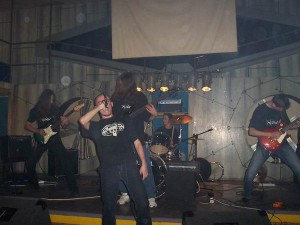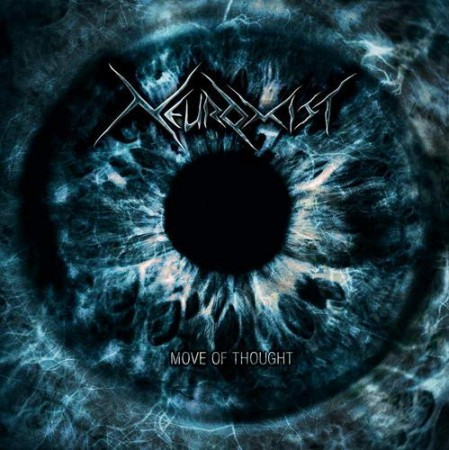The Republic of Moldova is a nation of about 3.5 million people, physically the size of Maryland, located near the Black Sea between Romania and Ukraine. Once part of the Soviet Union, it gained independence in 1991. Like many of the former Soviet Republics, it has faced economic challenges, and by most standard economic measures it’s one of the poorest countries in Europe. As a launching pad for extreme metal bands, you’d have to think it’s not ideal.
Yet even in this small country that most Americans probably haven’t even heard of, there’s an underground metal scene. And it has produced a band called Neuromist that we think is worth close attention.
There are four guys in this operation: Kirill (“Cyke”) Zmurciuk (guitars), Mike Grigorash (drums), Alex Petriuk (bass), and Vladimir Ghilien (vocals). After starts and stops lasting almost two years, they’ve finally finished and released their first album, called Move of Thought — and it’s a striking debut. In fact, we like the music so much we’ve agreed to help the band distribute the album by making it available for free download in its entirety on this site.
As if trying to break out their music from Moldova weren’t a big enough hurdle, these dudes have focused their efforts on a style of metal that presents more-than-typical challenges to success, both in songwriting and in execution. They list among their influences bands such as Atheist, Coroner, Cynic, and Meshuggah (plus some other interesting names), and that’s indeed the musical landscape where they’ve chosen to make their mark — with remarkable success. (more after the jump, including a track to stream and that download link we promised . . .)
 As that list of influences suggests, Move of Thought delivers inventive, complex music in a style that some might label math-metal and others might call a fusion of jazz improvisation and extreme metal heaviness. The songs incorporate changing metric structures, irregular tempos, complex rhythmic patterns, and contrasting progressive instrumental interludes.
As that list of influences suggests, Move of Thought delivers inventive, complex music in a style that some might label math-metal and others might call a fusion of jazz improvisation and extreme metal heaviness. The songs incorporate changing metric structures, irregular tempos, complex rhythmic patterns, and contrasting progressive instrumental interludes.
Each song combines a variety of moods and themes. One establishes itself, and then another appears — sometimes abruptly and sometimes in a smooth transition — and then the instruments take off in an improvisational variation, and then earlier themes eventually reappear like lost friends as the instruments periodically unify in harmony.
This style of music runs the risk of coming across like a patchwork quilt, as a stitching together of unrelated segments. But Neuromist avoids that pitfall. In their song-writing construction, they succeed in using contrasting rhythms and tones to develop and enhance their dynamic message. The dense layering of sounds and patterns on Move of Thought produces a result that is cohesive instead of haphazard.
None of the ambitious song construction would work without a high level of skill in the execution, but Neuromist brings that, too. Each of the musicians is assured and accomplished in his playing, and the music is mixed in a way that all are co-equals in the sound and each is vital to the result.
 On many (probably most) extreme metal albums, the bass-playing is a neglected step-child. You’d probably notice if it weren’t around at all, but its presence is indistinct. But on Move of Thought, Alex Petriuk’s bass is front-and-center. He produces an unusually varied number of tones and rhythms, from a hard-edged metallic clanging to deep chugging to nimble tapping higher in the register. On this album, the bass is never out of sight or out of mind, and its sound is part of what brings jazz fusion to mind as we listen to the album.
On many (probably most) extreme metal albums, the bass-playing is a neglected step-child. You’d probably notice if it weren’t around at all, but its presence is indistinct. But on Move of Thought, Alex Petriuk’s bass is front-and-center. He produces an unusually varied number of tones and rhythms, from a hard-edged metallic clanging to deep chugging to nimble tapping higher in the register. On this album, the bass is never out of sight or out of mind, and its sound is part of what brings jazz fusion to mind as we listen to the album.
Kirill Zmurciuk (with an occasional solo assist from session musicians Tony Alien and Mike Petriuc) produces an equally impressive array of music in his guitar work: Distorted riffing, screaming shreds, clean melodic arpeggios, freaked-out jazz leads, funk rhythms, soft and loud, simple and complex, playing alternately in contrast to and in sync with what’s happening on the other instruments.
Mike Grigorash’s work behind the kit both anchors the pyrotechnics of the bass and guitar and adds its own dynamic voice to the chorus. Though the drums veer from one time signature to another, sometimes in unison with the other instruments and sometimes in counterpoint to them, the playing is always controlled. Grigorash can dish out the blast beats when it suits the moment, but he’s not out to play the show-off or break speed records. As in the case of the other instruments, what he does is part of an integrated pattern.
 Neuromist is first and foremost an instrumental collective, and the vocals are not as dominant a part of the music as in most bands. But they are nonetheless an important ingredient in the songs. Vladimir Ghilien mainly sings in a harsh, growling, Slavic-accented howl that opens up like a yawning chasm, but he mixes in staccato barking, occasional shrieking, brief snatches of clean singing on two of the songs, and even eerie whispers. He steps off stage much of the time to allow the instrumentalists to strut their stuff, but when he delivers, his voice adds uniquely to the texture of the sound.
Neuromist is first and foremost an instrumental collective, and the vocals are not as dominant a part of the music as in most bands. But they are nonetheless an important ingredient in the songs. Vladimir Ghilien mainly sings in a harsh, growling, Slavic-accented howl that opens up like a yawning chasm, but he mixes in staccato barking, occasional shrieking, brief snatches of clean singing on two of the songs, and even eerie whispers. He steps off stage much of the time to allow the instrumentalists to strut their stuff, but when he delivers, his voice adds uniquely to the texture of the sound.
And in the end, that lush layering of textures, patterns, and tones is what distinguishes the music. Neuromist’s debut splashes the sonic canvass with an array of powerful colors and displays a level of comfort and assurance in its technical inventiveness that’s remarkable for a first effort. Our appreciation for what the band has achieved on Move of Thought grows with each listen. The songs demand repeat play, and reward the attention with new discoveries each time.
They remind us of other modern bands that are pursuing similar musical courses to great effect — Textures (UK), Tardive Dyskinesia (Greece), Gorod (France), and Carnal Rapture (Italy), to name a few. We don’t quite put them in the same league with those bands, but Neuromist is off to a great start, and we highly recommend this album. This courageous young band from a small nation deserves a wider audience, and we hope they get it.
 See for yourself. First, we’ll give you one track to stream as a test case, and then after that you’ll see links that will allow you to download the whole album, plus album art and lyrics (which are cool), in two different condensed formats.
See for yourself. First, we’ll give you one track to stream as a test case, and then after that you’ll see links that will allow you to download the whole album, plus album art and lyrics (which are cool), in two different condensed formats.
We offered a full album download for the first time earlier this week on behalf of another band (Blastanus), using a file-hosting and delivery service we pay for, and it seems to have worked as we intended. In case you’re wondering, we don’t make a dime from doing this (and of course the bands don’t either). Our aim is simple — to help new artists we think are deserving get their music out into the world. Have at it.

